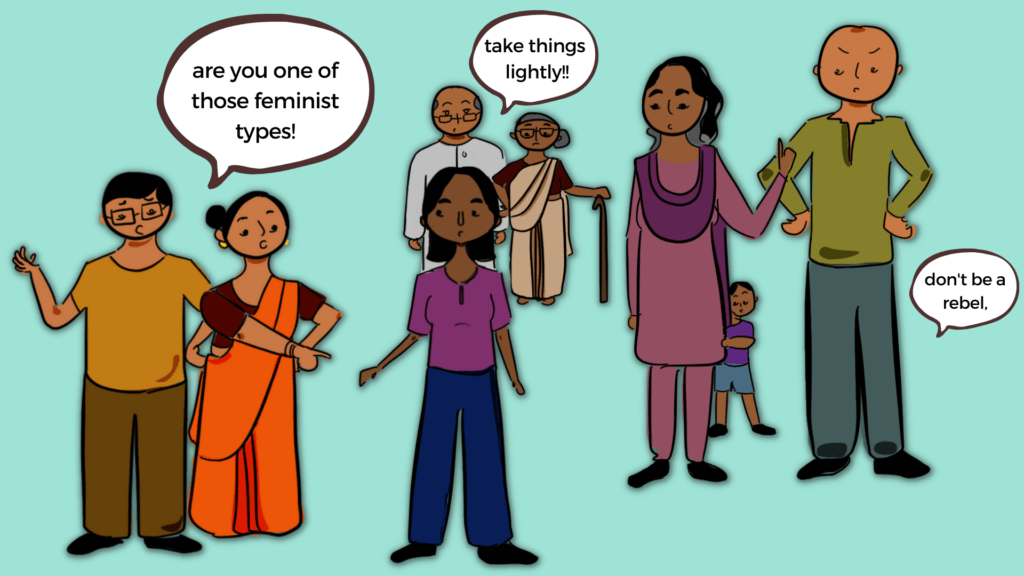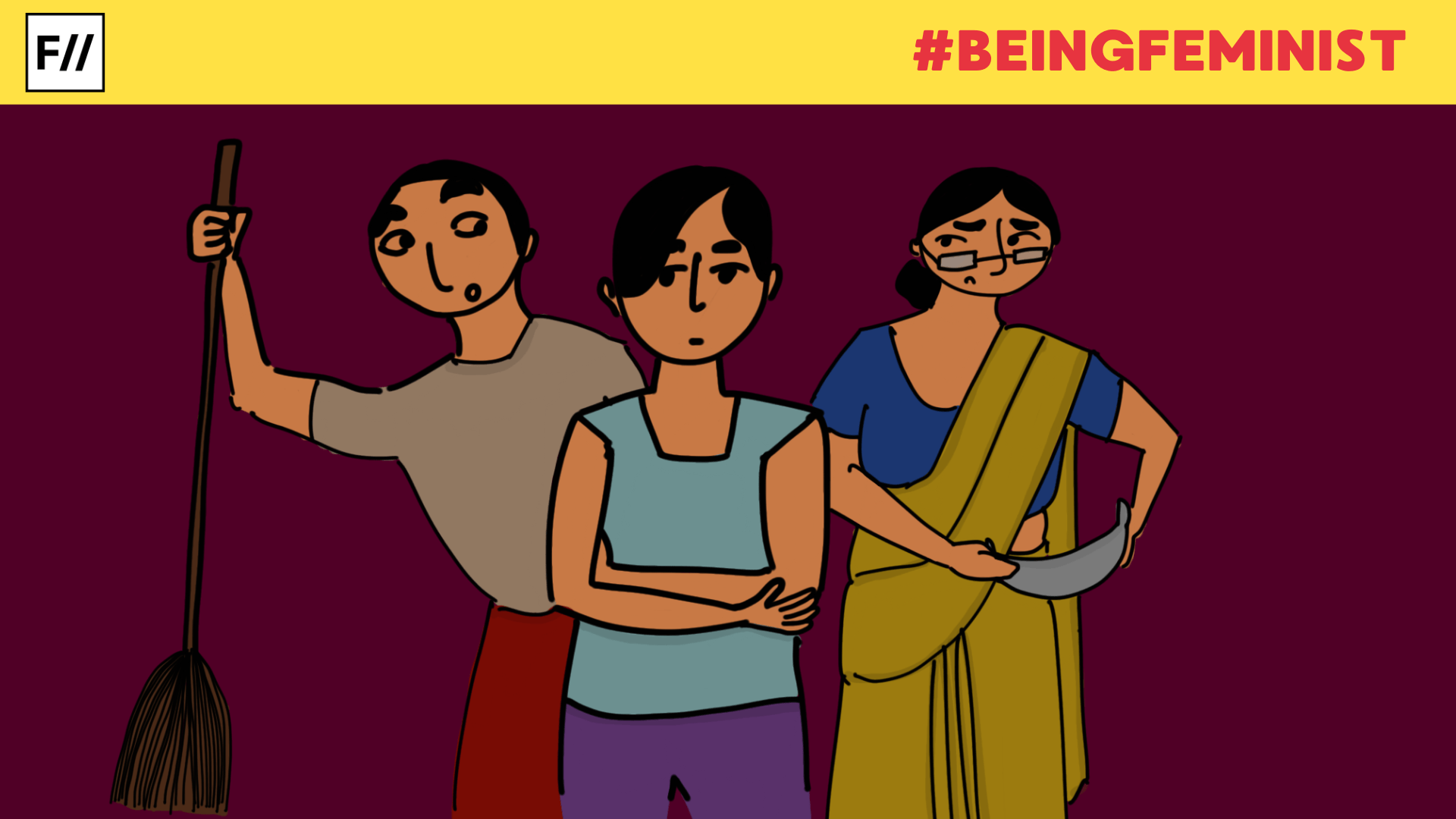Every family gathering in my household follows the same script. Before the guests arrive, the house is cleaned and made aesthetically pleasing by my mother. She has to give thought to the needs and wants of every family member who will be coming. When the guests arrive, the women and girls of the family make a beeline to the kitchen as soon as food has to be made and served while the men of the family dine lavishly at the table. The women eat at the end and also clean up the mess.
Social gatherings that are supposed to be about leisure, unwinding, refreshing memories and sharing a laugh are like a chore for most women. The enjoyment of one party depends upon the work of another.
Similarly, every Holi when my extended family meets to celebrate together, the women in the family are toiling away in the kitchen to prepare the array of foods that everybody will enjoy while everyone else is playing Holi. Almost without fail, I participate in this and each time I think about the inequity of household labour in such settings but have a difficult time voicing my discontent. In academic and peer-based settings I am very vocal about these issues but in practice, there are multiple factors that silence me.

There are incessant and varied instances of the same in everyday life where I see the women in my family perform so much physically gruelling and emotionally complex work for the family without appreciation, recognition or monetary benefit. Their work goes much beyond the standards of ‘necessary.’
From the bowl of cut-up fruit provided at one’s seat to account for everyone’s taste while preparing lunch, their labour is entrenched in constant providing. However, their labour is an expectation rather than a service. I find myself in a paradoxical position where I not only benefit from this every day but in social situations, also emulate this behaviour. This leads me to ask myself if I can credibly call myself a feminist if I can’t speak up in times when it really matters.
I recognise that such gender roles are socially ordained and require structures of patriarchy to be broken in order for more equality. However, there is a very material harm that women face in domestic settings that needs to be flagged and called out. On the other hand, every time I raise concerns regarding these issues, I am met with resistance and apathy. The elders of the family very aggressively maintain these social values and refuse to sway from ‘tradition.’
In such situations, it seems easier to maintain the peace and quietly comply. In fact, those who maintain harmony by asking questions are rewarded. This serves to create divisions between the ‘good‘ women and the ‘bad‘ women.
The common response I get when I occasionally point out the unfair division of labour is that it is an equal division of work where men are breadwinners and women work at home. However, they often fail to account for multiple factors. Is the choice of being a homemaker an autonomous one or is it a social prerequisite?
Arbitrary divisions of labour exist in other spheres of our life too. For instance, in group projects, I see my male classmates ‘assign‘ ppt making work, aesthetic and designing work to the women of the group while ideation remains their realm. In peer settings such arbitrary divisions of labour are easier to call out.
Also Read: Navigating Through The ‘Marriageable Age’ As An Only Child While Being A Feminist
Similarly, we learn about workplaces being inequitable because of the pay gap, the lack of facilities for women, the skewed interpersonal relationships and the judgement and discrimination. However, greater interventions in the workplace are still possible because there exist some nascent forms of legal and formal complaint mechanisms. However, no such possibility exists in the unregulated sphere of the home.

The common response I get when I occasionally point out the unfair division of labour is that it is an equal division of work where men are breadwinners and women work at home. However, they often fail to account for multiple factors. Is the choice of being a homemaker an autonomous one or is it a social prerequisite? What about women who work jobs, is it fair for them to do so much labour within the household too? Is the same dignity, promotion, financial security and payment provided to women who work at home?
Do they get the same liberty of retirement and ‘evening rest‘ that comes with working a 9-5 job? There are endless such questions that have been frequently asked before but somehow we fail to ask the same questions at home which lift the thin veil of tradition and expose the underlying misogyny.
My mother often asks me to ‘tone it down‘ because even though she agrees, these are questions no one in the family has dared to ask before.
Families are only able to run because of the invisibilised labour of women and any question of the status quo is an attempt to redistribute that labour and place greater accountability on other members of the family. It provokes defensive responses because it is hard to challenge our social conditioning. Any callout is met with harsher criticism and pushback.
Also Read: Gaining Confidence In My Feminist Identity
I fear asking questions because I am met with the threat of alienation and shame from the one unit that is supposed to be my support system. When strict codes of discipline are placed on me and everyone else, it is also harder to start discourse and gain support for your stance. My mother often asks me to ‘tone it down‘ because even though she agrees, these are questions no one in the family has dared to ask before.
This ties to a larger question I face in practising my feminism. How do I tackle instances of conflicting beliefs in discourse when they can affect my interpersonal relations? I am increasingly uncomfortable with remaining silent because I see that the sexist and discriminatory practices within the household do not remain in a vacuum. They become a legacy or ‘tradition‘ and are internalised by everyone. We are often taught that such practices irk us more because of the generation gap and they are not bound to carry to the next generation.

However, the conversations around marriage are the most revealing about how these social practices are bound to be reproduced unless we consciously engage in a process of unlearning. The requirements of the modern ‘bahu’ may be different but they still enforce the same roles of expected unpaid labour. Similarly, in family settings, we socialise with girls to help out with domestic activities while the same is not true for young boys. These differences will inevitably carry over if they aren’t nipped in the bud. This would include some difficult conversations.
These conversations may not be possible for everyone owing to different family contexts but I am learning to pick my battles. It may be hard to cause immediate change and we may never even see any transformation in the family situation but each conversation at least poses doubts about the structural patriarchy that we have internalised.
Feminist victories don’t have to manifest in the form of big disruptions but they can also be won in everyday battles. Recently, making food and eating has become a collaborative activity in my house where everyone helps in some form or the other. Household chores are evenly divided and there is a greater degree of responsibility for everyone else. When guests arrive, the role of the hostess is not only a sole burden for my mother.
This is not a massive transformation but it is a shift in the way that things were done. It is the product of uncomfortable conversations and posing difficult questions.
About the author(s)
Sakshi (she/they) is a student pursuing History at St. Stephen's College, Delhi University. They are interested in issues of gender, sexuality, education and culture. They love game nights, a good film and a sleeping in.






